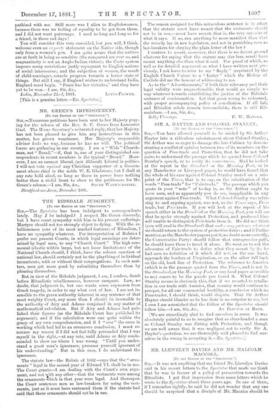THE RIDSDALE JUDGMENT.
[To THE EDITOR OF THE " SPECTATOR."]
Sxa,—The Spectator has been indulgent to correspondents lately. May I be indulged? I respect Mr. Green sincerely,
but I have scant sympathy with him in his present sufferings.
Martyrs should not too strongly object to dying. With the re- belliousness (one of its most marked features) of Ritualism, I have no sympathy whatever. For interpretation of Rubrics I prefer our present Courts, in which legal meanings are deter- mined by legal men, to any " Church Court." The high cere- monial (elastic within large, but not loose limitations) of the National Church should, I think, have the solemn sanction of stational law, should certainly not be the plaything of individual incumbents, with or without their congregations. In such mat- ters, men get more good by submitting themselves than by pleasing themselves.
But in view of the Ridsdale judgment, I am, I confess, dumb before Ritualistic rebelliousness, however rampant. Law, no doubt, that judgment is, but one wants some oxymoron from Greek tragedy, in order to say what sort of law. I am not in- sensible to the grave authority inherent in any sentence of that most weighty Court, any more than I should be insensible to the authority of Airy and Adams conjoined in any matter of mathematical calculation. But if Airy and Adams had pub- lished their figures (as the Ridsdale Court has published its argument), and if the calculation were one quite within the grasp of soy own comprehension, and if I "saw" the error in -working which had led to an erroneous conclusion, I must re- nounce my reason if I did not feel fully persuaded that.I was myself in the right,—at any rate, until Adams or Airy conde- scended to show me where I was wrong. "Until you under- stand a great man's ignorance, presume yourself ignorant of his understanding." But in this case, I do understand the ignorance.
The statute law—the Rubric of 1662—says that the " orna- ments " legal in the second year of Edward VI. shall be in use. The Court grants—I am dealing with the Court's own argu- ment, and not iith any other—that the vestments were among the ornaments which in that year were legal. And thereupon the Court sentences men as law-breakers for using the vest- ments, just as it must have sentenced them if the statute had said that those ornaments should not be in use. The reason assigned for this miraculous sentence is in effect that the statute must have meant that the vestments should not be in use,—must have meant, that is, the very opposite of what it says. If so, can anything be more manifest than that the remedy lay in new legislation, and not in punishing men as law-breakers for obeying the plain letter of the law ?
I venture to assert, moreover, that there is no decent ground whatever for saying that the statute may (far less, must) have meant anything else than what it said. For proof of which, as well as for detailed argument on what I have written next pre- viously, I ask leave to refer to my " Reply " (reprinted by the English Church Union) to a " Letter " which the Bishop of Carlisle did me the honour of addressing to me.
As to the " Advertisements," if both their relevancy and their legal validity were unquestionable, that would go simply no way whatever towards establishing the justice of the Ridsdale sentence of condemnation. Let that great wrong be redressed, with proper accompanying policy of conciliation. If all fail, and Ritualist rebels remain irreconcilable, there is still Kil- maiuham.—I am, Sir, &c.,










































 Previous page
Previous page